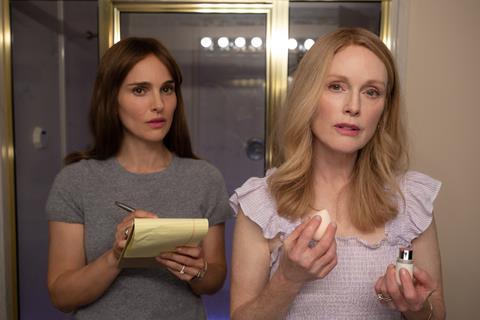Julianne Moore and Natalie Portman have an intriguing synergy – and symmetry – in Todd Haynes’ Competition drama

Dir. Todd Haynes. US. 2023. 118mins
Todd Haynes may no longer be making the kind of conceptually audacious films as the experimental days of Velvet Goldmine and I’m Not There but, now that he has entered his mature phase as an American classicist, he’s still adept at introducing conceptual play into ostensibly mainstream material. As a practitioner of contemporary melodrama – with Far From Heaven and Carol showing how perfectly he had mastered the teachings of Douglas Sirk – Haynes makes intriguing work of subtly metafictional psychodrama in May December, the story of an actress researching her role in a film about a scandalous cause célèbre.
A drama that develops and unfolds delicately and gradually
Scripted by first-timer Samy Burch, this Cannes Competition entry offers sly stylistic play, together with a terrific pairing of two performers on great form – Natalie Portman and long-term Haynes lead Julianne Moore, engaged in brisk mirror play. This combination should add commercial appeal to a very grown-up package that may be upmarket niche, but should receive a solid prestige reception.
The drama is a curious one, built on a backstory that is slowly, teasingly eked out. Portman plays Elizabeth, an actor known for her TV roles who arrives in Savannah, Georgia, to research her part in a film about Gracie Atherton-Yoo (Moore), a woman who became nationally notorious, and the subject of much tabloid exposure, after being arrested for having a relationship with a 13-old-boy. The relationship lasted, the couple are now married with college-age children, and Gracie’s domestic life with hospital worker Joe Yoo (Charles Melton), now 36, seems a happy, balanced one. At least, it’s a highly presentable performance of a gracious life, and Gracie – poised, smiling, but evidently a touch brittle – is clearly determined to keep it that way.
Elizabeth spends time with Gracie, Joe and their family, pursuing research that walks a perilous line between discreet and intrusive, while her interest in their story mixes personal identification with prurient curiosity – not least about the couple’s first illicit liaison in the back room of a pet store. The actor has meetings with various people in this enclosed community, including Gracie’s ostensibly affable but still visibly scarred ex-husband Tom (D.W. Moffet) and her oldest son with Tom, the abrasive, embittered small-time rock musician Georgie (Cory Michael Smith). The more Elizabeth learns from them, the more we learn about her motives – except that it’s not a ‘story’, Joe objects, it’s the real life of real people.
What might easily have become a mechanical, speculative investigation into the ethics of ‘torn-from-the-headlines’ cinema becomes a drama that develops and unfolds as delicately and gradually as the Monarch butterflies that Joe tends as a hobby. Joe, in fact – played with beautiful reserve by Melton, from TV series Riverdale and Poker Face – emerges as the most troublingly layered character here, partly because Melton’s performance encourages us to think about the character’s emotional history.
The way that Gracie still treats Joe as if he were a young boy, and the fact that he admits to his teenage son Charlie (Gabriel Chung) that he has never smoked a joint, add to our understanding that Joe must have jumped straight from early adolescence to adulthood, entirely missing out on his teenage years – partly because of the trauma of public notoriety, partly because of the emotional storms of his experience with Gracie. Under the cover of the clichéd picture of forbidden romance proposed by the film’s title, the romantic picture that Gracie clings to is clearly more problematic than she wants to admit. It’s only towards the end that we fully confront the real problems that the proposed film-within-a-film is fictionalising – and that the couple’s long-term denial is working so hard to conceal.
Melton’s performance is the revelation of the film, gradually breaking Joe down from a gentle, affable hunk to someone whose psyche has been ground down by long-term stress. Moore, meanwhile, unpacks Gracie with characteristic steely nerve, in a performance that mixes neurotic fragility and over-bearing brittleness in a manner somewhat reminiscent of her role in Tom Kalin’s 2007 Savage Grace. And, meshing tightly with Moore in a visual construction that often makes the mirror games literal, Portman makes Elizabeth a genuinely mysterious figure – seeming to hide her real self, as actors sometimes do, while absorbing aspects of Grace. She is sometimes an apparent ingenue detective, at others manifestly manipulative.
Haynes’s most striking stylistic trick here is to use Michel Legrand’s score for Joseph Losey’s The Go-Between, its dramatic chords reworked by composer Marcelo Zavros who also contributes original material. One effect is to signal the film’s themes – exploitation, innocence, the arrival into a closed world of an outsider who exposes hidden realities. Haynes and DoP Christopher Blauvelt occasionally ring changes on Losey and DoP Gerry Fisher’s 1971 visual style, notably in close-ups of insect life and lush Southern foliage, among other images of a sun-kissed, superficially perfect suburban world.
May December, however, isn’t a period pastiche, but a generally naturalistic drama with some striking touches that remind us of its metafictional dimension: those mirror effects, with Moore and Portman often framed in exaggerated symmetry, and TV images that make us wonder just how much Elizabeth’s movie really will be about the search for truth, or something more basic.
Production companies: Mountain A Productions, Gloria Sanchez, Killer Films
International sales: Rocket Science, jls@rocket-science.net
Producers: Natalie Portman, Sophie Mas, Christine Vachon, Pamela Koffler, Grant S. Johnson, Tyler W. Konney, Jessica Elbaum, Will Ferrell
Screenplay: Samy Burch
Story: Samy Burch, Alex Mechanik
Cinematography: Christopher Blauvelt
Editr: Affonso Goncalves
Production design: Sam Lisenco
Music: Michel Legrand, Marcelo Zavros
Main cast: Natalie Portman, Julianne Moore, Charles Melton, Cory Michael Smith
























